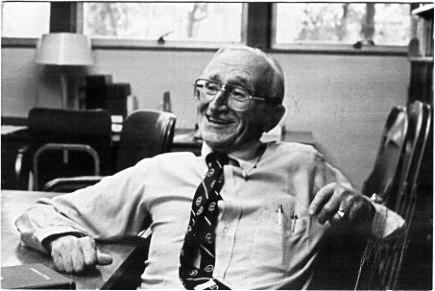Liberty Matters
It’s Not Easy Being Hayekian

Hayek's epistemic institutionalism is hard, I think, because it combines two things we have trouble thinking about in a scientific way: 1) the division of knowledge and 2) human meanings. Boettke's opening essay addressed the first thing, the division of knowledge, and his last comment addressed the second thing, human meanings. It is hard to think about these things in a scientific way because our chief exemplar ("paradigm" if you wish) of "science" is Newton's great system. As Stuart Kauffman (2014, p. 267) has said, "Newton taught us how to think."
Newtonian physics (however broadly or narrowly we interpret that phrase) is about a unified viewpoint, that of the observer. In economics, by contrast, we have many points of view, those of the "atoms" of our analysis, the many persons in society. (Simmel 1910) We have humans interpreting the world and acting, perhaps freely, in it. In physics, there are no people. Matter does not talk. (Machlup 1978) And, relatedly, there is no division of knowledge in physics or multiplicity of interpretations. One physicist may interpret their topic differently than another, but the object of inquiry does not contain multiple viewpoints. Nor is knowledge about that system distributed across the system.
In the following table I classify systems according these two dimension of dispersed knowledge and human meanings. A field of inquiry may study systems that do contain a division of knowledge or systems that do not contain a division of knowledge. A field of inquiry may study systems that do include humans or systems that do not include humans. The table also gives an example of a field of inquiry for each of the four types of system possible under this humble classification.
| There is a division of knowledge within the systems studied | There is no division of knowledge within the systems studied
| The systems studied include humans | Economics | Psychology
| The systems studied do not include humans | The theory of distributed computing | Physics
| The systems studied include humans | Economics | Psychology
| The systems studied do not include humans | The theory of distributed computing | Physics
We are pretty good at physics. We know how to conduct a scientific study of systems in which there is no division of knowledge and no humans within the system. In the figure above, economics is at antipodes to familiar physics. The systems studied include both humans and a division of knowledge. If Kauffman was right to say, "Newton taught us how to think," then perhaps it is not surprising that we struggle with systems so far from physics.
But if economics is so far from physics, why do so many economists try to use the methods of physics? One might, I suppose, rail against this move, upbraiding foolish economists for using inappropriate methods. And Hayek wrote an important book criticizing the "slavish imitation of the method and language of Science" in the social sciences. (Hayek 1952) Notice, however, that he did not criticize the use of the methods of physics, but only the "slavish imitation" of methods developed in other fields. Why the qualification? Why not just smash the use of methods from physics when physics might seem to be the very opposite of economics? I think the answer has to do with what Hayek thought to be the very reason for social science in the first place. Hayek taught that it is only spontaneous order and unintended consequences that create the need for social science in the first place. Our core scientific question is how unplanned order is possible. But precisely because the order in a spontaneous order is unplanned, it has no human meaning. In this sense the order is "mechanical" and not meaningful. Economics, therefore, can in fact use methods first developed in physics. The great example here is general equilibrium theory, whose methods were explicitly borrowed from "Newtonian" physics.
This wrinkle about spontaneous order makes it even harder to know how we are to have a science of society. On the one hand, our object of inquiry contains a division of knowledge and human meanings, which carries us far from the familiar methods of more-or-less "Newtonian" physics. On the other hand, the actions of people within the systems we study generate unintended orders, which, precisely because they are unintended, have a certain similarity to the sorts of systems studied in physics. Economics must somehow span the great divide between C. P. Snow's two cultures of the sciences and the humanities. (1959) It can be done, and Hayek is my leading example. But it's not easy.
References
Hayek, F. A. 1952. The Counter-Revolution of Science: Studies in the Abuse of Reason. Chicago: University of Chicago Press.
Kauffman, Stuart. 2014. "On Ethical and Intellectual Failures in Contemporary Economics," Advances in Austrian Economics 18: 259-82.
Machlup, F. 1978. "If Matter Could Talk." In: Methodology of Economics and Other Social Sciences (pp. 309–32). New York: Academic Press.
Simmel, Georg. 1910. "How Is Society Possible?" American Journal of Sociology. 16(3): 372-91.
Snow, Charles Percy. 1959 [2001]. The Two Cultures. London: Cambridge University Press.
Copyright and Fair Use Statement
“Liberty Matters” is the copyright of Liberty Fund, Inc. This material is put on line to further the educational goals of Liberty Fund, Inc. These essays and responses may be quoted and otherwise used under “fair use” provisions for educational and academic purposes. To reprint these essays in course booklets requires the prior permission of Liberty Fund, Inc. Please contact oll@libertyfund.org if you have any questions.